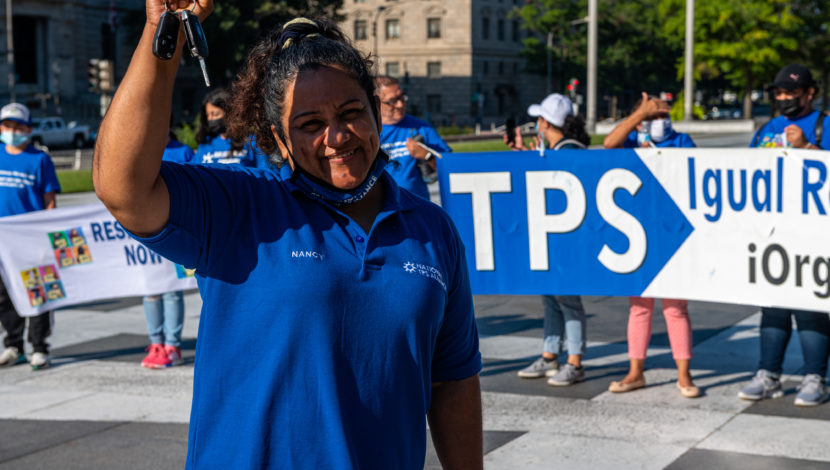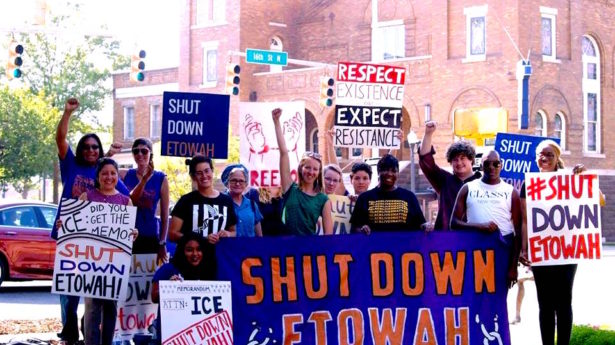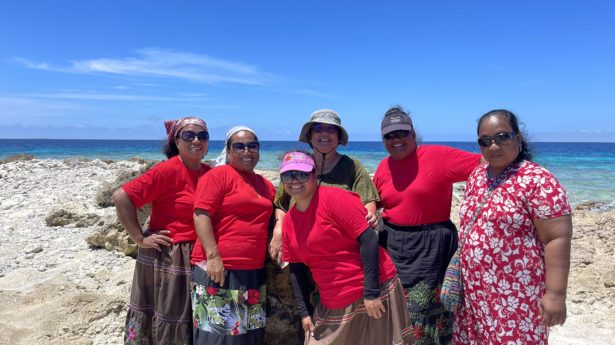The Unitarian Universalist Service Committee advances human rights through grassroots collaborations.
Immigrant Leaders Rally in D.C. to Demand Citizenship and Justice

By on September 30, 2021
Early in the week of September 20, a diverse coalition of immigrant leaders (including UUSC partners) met in Washington, D.C. Their goal was to urge Congress to enact a long-awaited path to citizenship for immigrants through the legislative tactic known as budget reconciliation. I was honored to join them on behalf of UUSC.
We knew from the start that this action was urgent. The inclusion of immigration measures in Congress’ current budget resolution represents the best chance we’ve seen in years to finally achieve citizenship for millions of people who have been unjustly excluded from that status, including immigrants with DACA, Temporary Protected Status (TPS), and others who worked in frontline professions during the pandemic.
What we couldn’t know going in, though, was how much more timely our action would become, almost as soon as we set foot in the nation’s capital.
Late on Sunday, September 19—when many of us had already turned off our screens for the day—terrible news broke. The Senate parliamentarian, an unelected official charged with interpreting the arcane rules of Congress’s upper chamber, had issued a recommendation against including citizenship provisions in the reconciliation deal. Some senators were likely to want to follow this advice. Overnight, therefore, the struggle for citizenship had become an even more uphill battle.
We also knew, however, that this was far from the last word. The reasoning the parliamentarian provided was strained and illogical, and our elected officials don’t have to treat it as binding. After all, the Senate is a sovereign body. If the majority of the chamber and the vice president (as its presiding officer) decide to do something, they are not bound by the advisory opinion of their own employee. Nor is the specific proposal the parliamentarian rejected the only one Senate leadership committed to put before her.*
Thus, our partners were undeterred. The very next morning, the National TPS Alliance—a coalition of immigrants from countries facing humanitarian crises, whose protected immigration status Trump tried to cancel—awoke early and converged on Freedom Plaza. There they chanted, made music, and reasserted their commitment to fight for citizenship no matter the obstacles put in their way. TPS Alliance organizer Doris Landaverde addressed the crowd. Repeatedly, she asked them if they were done fighting for justice and permanent residency. “No!” they replied.
Then, the procession began. Hundreds of TPS holders from 13 different national backgrounds filled the downtown streets and marched to the threshold of the White House in Lafayette Square. There, TPS immigrants hoisted enormous wooden birds symbolizing the countries of El Salvador (where the largest group of TPS holders originally hails from), and the United States. Beneath these emblems, a woman from Honduras told about how she came seeking a new life in the United States, but now must live in fear of one day being arrested and deported from her family.
A child of TPS holders—a citizen of the United States—also spoke. She described growing up in a country where she and her family were treated as lesser, simply because they were immigrants. She said she recognized the dual aspect of the U.S. government and how it treats oppressed people:
“You are the U.S. of civil rights,” she said, “and you are the U.S. of Donald Trump. Which one will you be to us?”
Finally, we marched to the national mall and rallied within sight of Congress. There, numerous TPS holders shared their personal stories and demonstrated how much they had given to this country—as employers, business owners, community leaders, and friends—even as it continued to disavow them as permanent residents.
Crista Ramos, the lead plaintiff in a lawsuit challenging Trump’s cruel terminations of TPS status, called attention to the situation of the more than 275,000 U.S. citizens who, like herself, are the children of TPS holders. All of them face potential long-term separation from their parents if a permanent solution is not found.
Members of Congress also lent support. Representative Ayanna Pressley of Massachusetts addressed the crowd. She acknowledged the role TPS holders play in contributing to the economy and saving lives during the pandemic (a time when they, like many other immigrants, have worked disproportionately in high-risk frontline professions); but, she added, her reason for solidarity with TPS immigrants went far deeper than that:
“I’m not here because your labor matters;” she said. “I’m here because your lives matter.”
This action for TPS holders was only one of several that week that reiterated the call for a path to citizenship. The very next day, our partners at the TPS Alliance and I were back in front of the U.S. Capitol for the even more massive “Welcome Back Congress” rally, to call for robust citizenship, climate, and care provisions in the budget reconciliation deal. This time, the crowd may well have numbered 10,000 people, with broad representation from the immigrant rights, racial justice, and organized labor movements.
These social movements are the backbone of the grassroots mobilization that led to a historic national election in November, 2020. Our leaders must heed their demands—those of their constituents— more than the arguments of an official who was never elected and has little accountability to the U.S. public.
Now is still the best opportunity we’ve had in a generation to get a path to citizenship passed into law, and budget reconciliation remains the most plausible pathway. Senators must not wait and let millions of people’s futures once again fall victim to congressional inaction.
*Since then, as of Wednesday, September 29, the parliamentarian has also recommended against an alternative proposal that would protect somewhat fewer immigrants. However, some senators remain committed to presenting still further options to the parliamentarian, and none of these advisory opinions prevent Senate leadership and the Vice President from overruling the parliamentarian’s recommendation.
***
About UUSC: Guided by the belief that all people have inherent worth and dignity, UUSC advances human rights globally by partnering with affected communities who are confronting injustice, mobilizing to challenge oppressive systems, and inspiring and sustaining spiritually grounded activism for justice. We invite you to join us in this journey toward realizing a better future!
Image Credit: UUSC

